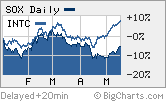 |
| Intel in stride? Shares of Intel have outperformed many other chip stocks this year thanks to a healthy outlook. |
|
|
|
|
|
| More about Intel and the semi sector
|
|
|
|
|
NEW YORK (CNN/Money) � For the first time in its nearly 40-year history, Intel will have someone who's not an engineer leading the company.
On Wednesday, Intel's current president Paul Otellini will assume the chief executive role. Otellini, who has been with Intel (Research) since 1974, worked his way up the corporate ladder mainly on the sales side.
So what will his ascent mean for investors in the world's largest chip firm? Is the fact that a non-techie will now be leading Intel a cause for concern?
Probably not.
For one, Otellini has been groomed for the CEO job for years so he is a known quantity on Wall Street. In fact, Otellini, not outgoing CEO Craig Barrett (who will remain chairman), has been a fixture of Intel's earnings conference calls for the past few years, along with CFO Andy Bryant.
And though Otellini isn't a trained engineer, after 30 years with Intel he likely knows his way around a semiconductor fab.
But most importantly, it makes perfect sense for someone with more of a marketing pedigree to be in charge, given the current state of the tech landscape, particularly the level of demand for personal computers.
"It's no secret that the PC business is a more mature business than 10 years ago," said Paul Leming, an analyst with Soleil Securities. "Intel needs someone with a different background."
Building the brand
Intel's one shortcoming over the past few years, says Cody Acree, an analyst with Legg Mason, is that it has failed to make major inroads in businesses outside its bread and butter market of manufacturing processors for PCs.
So Acree thinks that Intel, under Otellini, will focus even more intently on more rapidly growing end markets for its chips, such as cell phones, gaming consoles and other wireless and digital entertainment devices.
"There won't be a night and day change in corporate strategy but there will be more emphasis on the wireless and consumer markets," Acree said, adding that Intel will need to become a more formidable competitor to companies like Texas Instruments (Research), Broadcom (Research) and Qualcomm (Research).
That's not to say that Intel will lose its focus on innovation in the PC market. Intel and its top rival for PC chips, Advanced Micro Devices (Research), are in a constant game of one-upmanship regarding processing speeds. In addition, both companies are embracing new "dual-core" technology, which enable a chip to have two microprocessors on it.
"Intel always has been and will remain a strong tech and manufacturing-focused company," said Krishna Shankar, an analyst with JMP Securities.
But the company, already a savvy marketer, will probably become even more so under Otellini, Leming said. What Intel has done extremely well during the past few years is to create strong brand name awareness for its products thanks to a blitz of advertising. Think Pentium and the Intel Inside campaign.
"This is a classic response of a company that has seen its industry evolved. You have to be more marketing driven," Leming said.
Acree adds that Otellini's marketing strategy of "platformization" is likely to continue.
Rather than trying to sell one chip, Intel has been increasingly developing brand names for a platform of processors, such as its Centrino wireless chipset for notebook computers, in order to get device makers to buy more chips from it. That's helped boost profit margins.
"This is an area where Otellini is placing future emphasis -- using the brand success with Centrino and being able to sell a larger dollar amount of chips for notebooks, handsets, PCs and other devices," said Acree.
And that's not so much a technological innovation as it is a sales approach, convincing manufacturers that they need to be able to tout the latest Intel brand-name chip to attract consumer interest.
At this point, investors appear to be confident in Otellini's ability to lead Intel. Shares are up more than 9 percent this year, bucking the downward trend in the chip sector and tech in general, thanks largely to a solid first-quarter earnings report and an optimistic second-quarter forecast.
So it looks like Intel shareholders shouldn't worry too much about the changing of the guard. "Intel has a history of making smooth leadership transitions," Shankar said.
For a look at why it might be time to dip into chip stocks, click here.
For a look at how Intel and other semi stocks are doing, click here.
JMP's Shankar owns shares of Intel but his firm has no investment banking relationship with the company. Other analysts quoted in this piece do not own shares of Intel and their firms have no investment banking relationships with the company.
Sign up to receive the Tech Investor column by e-mail.
Plus, see more tech commentary and get the latest tech news.

|